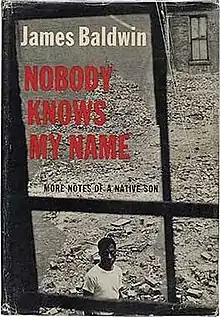Nobody Knows My Name
Nobody Knows My Name: More Notes of a Native Son is a collection of essays, published by Dial Press in July 1961, by American author James Baldwin. Like Baldwin's first collection, Notes of a Native Son (publ. 1955), it includes revised versions of several of his previously published essays, as well as new material.
 First edition cover | |
| Author | James Baldwin |
|---|---|
| Country | United States |
| Language | English |
| Genre | Essays |
| Publisher | Dial Press |
Publication date | 1961 |
| ISBN | 0-679-74473-8 |
Essays
| Essay title | Original appearance | Original title/adaption |
|---|---|---|
| "The Discovery of What It Means to Be an American" | The New York Times Book Review, 25 January 1959 | |
| "Princes and Powers" | Encounter, January 1957 | |
| "Fifth Avenue, Uptown: A Letter from Harlem" | Esquire, July 1960 | |
| "East River, Downtown: Postscript to a Letter from Harlem" | The New York Times Magazine, March 12, 1961 | "A Negro Assays the Negro Mood" |
| "A Fly in Buttermilk" | Harper's, October 1958 | "The Hard Kind of Courage" |
| "Nobody Knows My Name: A Letter from the South" | Partisan Review, Winter 1959 | |
| "Faulkner and Desegregation | Partisan Review, Fall 1956 | |
| "In Search of a Majority" | Adapted from an address delivered at Kalamazoo College, February 1960 | |
| "The Male Prison" | The New Leader, December 13, 1954 | "Gide as Husband and Homosexual" |
| "Notes for a Hypothetical Novel" | Adapted from an address delivered at an Esquire magazine symposium on "Writing in America Today," San Francisco State College, 22–24 October 1960 | |
| "The Northern Protestant" | Esquire, April 1960 | "The Precarious Vogue of Ingmar Bergman" |
| "Alas, Poor Richard" | Section 1: Reporter, 16 March 1961 | "The Survival of Richard Wright" |
| Section 2: Encounter, April 1961 | "Richard Wright"[1] | |
| Section 3: Nobody Knows My Name | ||
| "The Black Boy Looks at the White Boy" | Esquire, May 1961 |
Critical reception
In the New York Times, Irving Howe called it a "brilliant new collection of essays." He adds, "To take a cue from his title, we had better learn his name."[2]
References
- A French translation of "Richard Wright" appeared in Preuves, February 1961, entitled "Richard Wright, tel que je l'ai connu"
- Howe, Irving (July 2, 1961). "Nobody Knows My Name". New York Times.
This article is issued from Wikipedia. The text is licensed under Creative Commons - Attribution - Sharealike. Additional terms may apply for the media files.